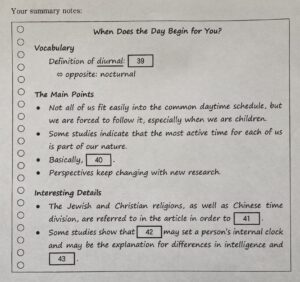第6問 A の模範解答・・・問題をやってから確認しましょう
それでは、先に模範解答です。
解答・・各3点
問1【 39 】ー 3 問2【 40 】- 3 問3【 41 】ー 1
問4【 42 】ー 6 【 43 】ー 3
第6問 A の解説
第6問 A では、「あなたの研究クループ」は1日の時間が人々にどのような影響を与えるのかを学んでいるようですが….
A Your study group is learning about “how time of day affects people.” You
have found an article you want to share. Complete the summary notes for
your next meeting.
|
When Does the Day Begin for You? ❶ When asked “Are you a morning person?” some reply “No, I’m a night ❷ Yet another proverb states: “Early to bed, early to rise makes a man ❸ What makes one person a lark and another an owl? One theory suggests ❹ Does everyone follow the system of beginning days in the morning? The ❺ Research indicates owls are smarter and more creative. So, perhaps larks ❻ Can people change? While the results are not all in, studies of young |

問1 Choose the best option for【 39 】.
① achieve goals quickly
② likes keeping pet birds
③ lively in the daytime
④ skillful in finding food
問2 Choose the best option for【 40 】.
① a more flexible time and performance schedule will be developed in the
future
② enjoying social activities in the morning becomes more important as we
age
③ it might be hard for us to change what time of day we perform best
④ living on the owl schedule will eventually lead to social and financial
benefits
問3 Choose the best option for【 41 】.
① explain that certain societies have long believed that a day begins at night
② indicate that nocturnal people were more religious in the past
③ say that people have long thought they miss chances due to morning
laziness
④ support the idea that owls must go to work or school on the lark
schedule
問4 Choose the two best options for【 42 】and【 43 】
① amount of sleep
② appearance
③ behavior
④ cultural background
⑤ religious beliefs
⑥ time of birth
それでは、詳しく問題を見ていきます。
解説 – 記事を読んでまとめのメモを完成
👉どの問題も「ある設定」のもとでの「英文読解」なので、
一番最初にするべきことは、その「設定」をしっかり把握することです。
▶︎その「設定」が、問題の最初に説明されているので、
まずは、それをしっかりと確認します。
【設定】
A Your study group is learning about “how time of day affects people.” You
have found an article you want to share. Complete the summary notes for
your next morning.
[登場人物]
・「あなた」
[設定状況]
[1] 👉赤いアンダーラインから
–「あなたの」研究グループが、1日の時間が人に与える影響について学んでいる
[2]👉黄色いアンダーラインから
– みんなと共有した記事を見つけた – [そしてその要約のメモ]をつくる
となっています。
▶︎この「設定」の下にあるのが、
その「読んでいる記事」と「その内容を要約したメモ」
となるわけです。
◎「読んでいる記事」のタイトルは、
“When Does the Day Begin for You?”
「1日はあなたにとっていつ始まるのか」というものです。
👉ここまでを、
理解した上で、「先に」問題の選択肢を簡単にチェックしてから、設問の後の
「記事」とその後にある「メモ内容」をチェック
したほうが良いようです。
問1について
【選択肢のチェック】
問1 Choose the best option for【 39 】.
① achieve goals quickly
② likes keeping pet birds
③ lively in the daytime
④ skillful in finding food
【内容】
問1【 39 】に入る最も適切な選択肢を選びなさい。
① 素早く目的に到達する
② ペットの鳥を飼うことが好き
③ 日中の時間に活動的
④ 食べ物を見つけることが上手
👉メモの【 39 】をよく見てみましょう。
| Vocabulary Definition of diurnal:【 39 】 ↔️ oppoiste:nocturnal |
※ Vocabulary [語彙] という項目で、Definition of diurnal というのは
「diurnal の定義」という意味です。
– このdiurnal, nocturnal という単語は、記事の中では❶の段落で登場します。
| The lark is a morning singer, so early birds, the opposite of owls, are larks. Creatures active during the day are “diurnal” and those emerging at night are “nocturnal.” |
▶︎ここの部分は…
・ひばりは、朝に鳴く鳥、だから早起きの鳥、フクロウの反対がひばりなんです。
・日中に活動的は動物は、diurnal で夜に現れるのが、nocturnal です。
という意味です。
▶︎ここからすると、
・diurnal は「日中に活動的な」こと
・その反対が nocturnal は「夜に活動的になる」ことで、「夜行性」
のような意味であると予測がつきます。
👉ここから、正解は
③ lively in the daytime であることがわかります。【 39 】
※【 39 】③
問2について
【選択肢のチェック】
問2 Choose the best option for【 40 】.
① a more flexible time and performance schedule will be developed in the
future
② enjoying social activities in the morning becomes more important as we
age
③ it might be hard for us to change what time of day we perform best
④ living on the owl schedule will eventually lead to social and financial
benefits
【内容】
問2 メモの【 40 】に入る最も適切な選択肢を選びなさい。
① より柔軟な時間と実行計画は将来開発されるだろう
② 私たちが年をとると共に午前中に社会的活動を楽しむことがより重要になる
③ 私たちにとって1日中で一番上手に活動する時間を変えるのは難しいのかもしれない
④ フクロウ型のスケジュールで生活することは最後には社会的にも経済的にも利益をもだらすだろう
👉メモの【 40 】をよく見てみましょう。
| The Main Points ⚫︎ Not all of us fit easily into the common daytime schedule, but we are forced to follow it, especially when we are children. ⚫︎ Some studies indicate that the most active time for each of us is part of our nature. ⚫︎ Basically, 【 40 】. ⚫︎ Perspectives keep changing with new research. |
※ The Main Points と書かれている項目なので、
読んだ記事の「主要ポイント」を示している箇所です。それぞれは次のような内容です。
⚫︎私たちが全員が簡単に共通の日中の計画に適合するとは限りませんが、
子供の時は私たちはそれに従わざるを得ません。
⚫︎私たちの個々の最も活動的な時間は、私たちの生まれつきのものであるという
研究もあります。
⚫︎基本的には、【 40 】。
⚫︎見方は新しい調査とともに変わり続けます。
・lark は「ひばり」、owl は「フクロウ」という意味ですが、
ここでは、それぞれ「朝型の/朝型の人」、「夜型の/夜型の人」という意味で
使われています。この意味で lark と owl が使われている場合はイタリック体に
なっています。( lark – lark / owl – owl )
それぞれの段落にどのようなことが書かれているか確認して見ましょう。
| ❶段落 ▶︎問題提起の部分 – a morning person か a night owl か ・ことわざ “The early bird catches the worm. ” について ・lark [diurnal] – owl [nocturnal] |
| ❷段落 ▶︎別なことわざ “Early to bed, early to rise makes a man healthy, wealthy, and wise.” ・Larks はベッドから飛び起きて、たくさんの朝食で朝を歓迎するかも ・owls は普通は朝食なしで、スヌーズのボタンを押して、ギリギリで準備をする ⇨食事の回数がすくなりなり、1日の遅い時間に食べることになる ⇨食事の後に運動をしないと体重が増える原因になる可能性がある ・大部分の学校教育は午後4時前には終わるので、若い larks はある種の課題をより うまく成し遂げるかもしれない ・1日の早い時間に行われるビジネスの取引は larks を裕福にするかもしれない |
| ❸段落 ▶︎lark型の人と owl型の人を決めるものについて ・日中か夜間かの好みは生まれた時間と関連があるはずだ – という理論あり ・2010年の Cleveland State University の研究者たちは、次のような証拠を 見つけた ⇨人の体内時計は生まれた瞬間に始まる ⇨ those born at night might have lifelong challenges performing during daytime hours「夜に生まれた人たちは日中の時間帯に活動することに一生涯の 難題を抱えるかもしれない」 ⇨普通、彼らの世界の経験は暗さと共に始まります ・従来の勉強時間や勤務時間は日中なので、1日は午前中から始まると思っている ・People asleep are not first in line, and might miss chances. 「眠っている人は、列の最初ではないので、チャンスをなくすかもしれません」 |
| ❹段落 ▶︎午前に1日が始まるというシステムにみんな従っているのか ・ユダヤ教徒の話 from the sundown to the sundown / from eve to eve ⇨キリスト教徒の話 the tradition with Christmas eve ・中国人の話 their system of 12 animals ⇨ rat の時間:from 11:00 p.m. to 1:00 a.m. ・中国文化 begins the day at night ◎昔からの慣習は owl型の時間の見方を支持している |
|
❺段落
▶︎ある調査では owl はより賢く、創造的であるという ・Richard D. Roberts と Patrick C. Kyllon の報告では |
|
❻段落
▶︎人は変わることができるのか ・若者の研究では no – 生まれつきのものなのだ (hard-wired) ・年を経て、自由を手に入れると、結局それぞれの生来の lark や owl の特徴に 結局戻るのだ ・この lark と owl のカテゴライズが全ての人に当てはまるわけではないという疑念 ・Nature Communications のある報告では ⇨DNA は時間に関する習慣にも影響を与えるかもしれない ・ある報告書では ⇨老化や病気によってある人々に起こる変化に注目している |
👉これを基に選択肢を確認しましょう。
① a more flexible time and performance schedule will be developed 〜.
▶︎「将来的」にどうなる、という話はなかったので、❌
② enjoying social activities in the morning becomes more important 〜.
▶︎「年をとると共に」- ある変化が起こるという研究の話はしていますが、このような
具体的な言及はないので、❌
③ it might be hard for us to change what time of day we perform best.
▶︎❻段落の最初の方で、”they end up returning to their larks or owl nature.” と
あり、結局その特質(朝方、夜型)は変わらないと言っているので、⭕️
④ living on the owl schedule will eventually lead to social and 〜.
▶︎ owl型の生活が利益につながる、というような話はないので、❌
👉ここから、正解が
③ it might be hard for us to change what time of day we perform best. となります。【 40 】
※【 40 】③
問3について
【選択肢のチェック】
問3 Choose the best option for【 41 】.
① explain that certain societies have long believed that a day begins at night
② indicate that nocturnal people were more religious in the past
③ say that people have long thought they miss chances due to morning
laziness
④ support the idea that owls must go to work or school on the lark
schedule
【内容】
問3 メモの【 41 】に最も適切な選択肢を選びなさい。
① 1日が夜に始まると長く信じている社会があることを説明する(ため)
② 夜型の人間は過去により宗教的であったことを示す(ため)
③ 人々は朝の怠惰さのためチャンスをなくすと長く考えていることを言う(ため)
④ owl は lark型の計画で仕事や学校に行かなければならないという考えを支持する(ため)
👉メモの【 41 】をよく見てみましょう。
| Interesting Details ⚫︎ The Jewish and Christian religions, as well as Chinese time division, are referred to in the article in order to【 41 】 ▶︎「ユダヤ教とキリスト教は、中国の時間区分けも含めて、【 41 】するために 記事の中で言及されています。」 |
※ Interesting Details という項目で
読んだ記事の中で「興味深かったこと」を示している箇所です。
【 41 】では、❹段落のユダヤ教徒、キリスト教徒の話の部分を扱っています。
❹段落の内容を簡潔に言い表しているのは、最後の一文です。
“In other words, ancient customs support how owls view time.”
「言い換えれば、古代からの慣習は owl型の時間の見方を支持しています」
👉ここから、正解は、
① explain that certain societies have long believed that a day begins at night となります。【 41 】
※【 41 】①
問4について
【選択肢のチェック】
問4 Choose the two best options for【 42 】and【 43 】
① amount of sleep
② appearance
③ behavior
④ cultural background
⑤ religious beliefs
⑥ time of birth
【内容】
問4 メモの【 42 】と【 43 】に最も適した選択肢を選びなさい。
① 睡眠の量
② 外見・様子
③ 行動・ふるまい
④ 文化的な背景
⑤ 宗教的な信念
⑥ 生まれた時間
👉メモの【 42 】と【 43 】をよく見てみましょう。
| Interesting Details ⚫︎ Some studies show that 【 42 】may set a person’s internal clock and may be the explanation for differences in intelligence and 【 43 】. ▶︎「ある研究では【 42 】は体内時計をセットし、知性と【 43 】における違いに対する説明と なるかもしれない」 |
※【 42 】は、その内容から、
“set a person’s internal clock” するものが「正解」になりますが、
❸段落に次のように書かれています。
“In 2010, Cleveland State University researchers found evidence that
not only does a person’s internal clock start at the moment of birth, 〜”
「人の体内時計は誕生の瞬間に始まります」
👉ここから、【 42 】の正解は、
⑥ time of birth ととなります。
※【 42 】⑥
※【 43 】は、その内容から、
「知性と共にその違いを説明する」ものが、「正解」となります。
👉少し表現が一般的なので、選択肢を1つ1つ確認しましょう。
① amount of sleep
▶︎「生まれた時間」で、睡眠の量が違うという話はないので、❌
② appearance
▶︎「生まれた時間」で、外見的な変化あるとは言っていないので、❌
③ behavior
▶︎「生まれた時間」で、lark (朝方)、owl (夜型)によって振る舞いは
違うという話はあるので、⭕️
④ cultural background
▶︎「生まれた時間」で文化的背景が違うという話はないので、❌
⑤ religious beliefs
▶︎「生まれた時間」で宗教的信念が変わるという話はないで、❌
👉ここから【 43 】の正解は、
③ behavior となります。

これで、
第6問 A を終わります。
次は、最後の第6問 B に入ります。



コメント